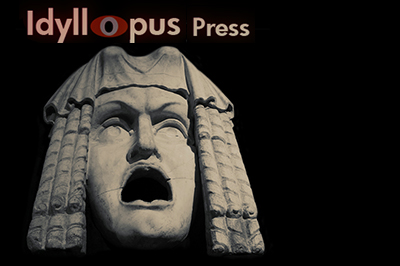
Go to TOC for this film ( (which has also a statement on purpose and manner of analysis and a disclaimer as to caveat emptor and my knowing anything authoritatively, which I do not, but I do try to not know earnestly, with some discretion, and considerable thought).
The most important line in Arthur Schnitzler’s novella, relative to the masked ball, occurs before it, when Fridolin (Bill) and his wife are sharing their sexual fantasies/attractions. Fridolin says to his wife, “In every woman—believe me, even though it may sound trite—in every woman with whom I thought I was in love, it was always you that I was searching for. I feel this more deeply, Albertine, than you can ever understand.” This is paraphrased by Fridolin in Wolfgang Glück’s 1969 Traumnovelle and Glück’s expression of this at the masked ball serves as an important bridge to Eyes Wide Shut.
People who want their film literal have a difficult time with the ambiguities Kubrick presents throughout his films, and no less so than with the happenings of Eyes Wide Shut. They want it all to be real. If there are suggestions of dream-time then they want it all to be dream with a definite entrance point from real life and a definitive gate back into real life. And this despite the fact that Kubrick holds true to Schnitzler’s insistence that no dream is ever just a dream, just as what we observe in “real” life doesn’t begin to describe the whole person.
This is spiritual territory. Mystic territory. That of Dionysus-Narcissus and the Gnostic mirror. It is the world of ritual and theater. It is what Kubrick was trying to bring into his film, and he’s certainly not the only artist to inject this into their work. We have theater which becomes “real life” then reverts to theater (for example, the theatrics of Be Black, Baby in Hi, Mom, perhaps referenced in Eyes Wide Shut, scroll down to the bottom of this page to see what I’ve written about it). We have ritual which becomes “real life”. I have written about these things multiple times in relation to Kubrick’s attempt to bring that immersive Dionysian theatrical quality to his work, a near magical involvement of the audience, his “thesis” for this rather laid out in Killer’s Kiss and its references to an obscure, magical film by Orson Welles. We even have it in Kubrick’s first work, Fear and Desire and its references to Shakespeare’s The Tempest and the magician Prospero who manipulates the experiences of others on his island so they are unwitting as to what is real and what is not, then at the end he entreats the audience to release him from that island and his role as the magician/director.
First and foremost, it is underworld territory, the world of the dead, from which we are normally separated by a seeming opaque wall beyond which we can’t see. Kubrick’s Eyes Wide Shut takes us ever deeper into the underworld until finally we have a distinct separation during Bill’s trip to Somerton in the taxi. When we see the “Happy Holiday” sign over the highway, there is in the background what had struck me as a funeral home, and I was eventually able to find and place that scene as showing the Oyster Bay funeral home. After this, the deciduous trees are replaced with evergreens, just as the Overlook Hotel in its evergreen territory is in the same realm, as is the Enchanted Hunters Lodge in Lolita. Wolfgang Glück’s Traumnovelle also takes Fridolin into the underworld in a very apparent way with his following to the masked ball the hearse in which rides the pianist, Nachtigall. After his confrontation at the masked ball, Fridolin is forced to take the same hearse home, rather than the coach in which he arrived, and during that trip he comes to feel as though he is dead and fights the walls of the hearse as if it is his coffin.
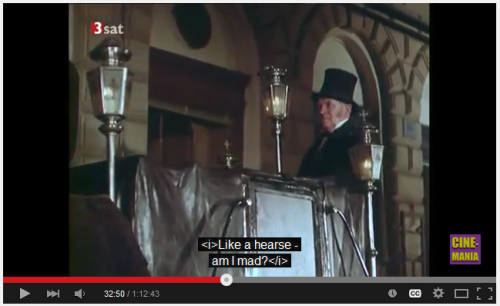
Many who are reading this are probably already aware of the identity confusion at the masked ball in Eyes Wide Shut. Who is the masked woman who redeems Bill? Was it Mandy, the model/prostitute? Some even believe that Alice is physically at the masked ball as signified by her relation of the dream in which she has sex with multiple men, and the opening shot of the film in which she slips out of a revealing black dress under which she wears nothing. But there is no “literally” here, and Wolfgang Glück’s Traumnovelle reveals this through the participants at the masked ball almost all resembling one another.
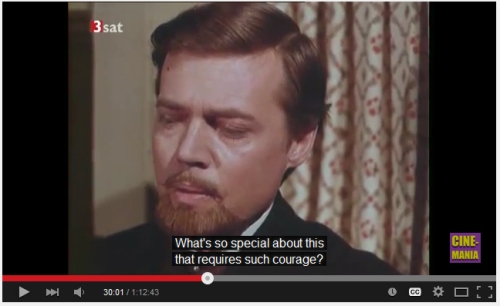
Fridolin resembles all the men at the masked ball, who have reddish hair cut in usually a similar style and all have his red mustache.

The cowls and masks not only hide identity but give a universality of appearance.
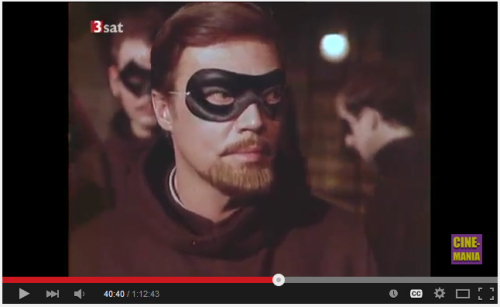
In Wolfgang Glück’s Traumnovelle, Fridolin’s wife is shown to be definitely at the ball. In the below shot we see her in her discussion with Fridolin on sexual desire.

Then we are given a glimpse of her at the masked ball. And yet she is *not* there at all. Fridolin doesn't recognize this woman, but is powerfully attracted to her. This is an underworld experience. And it is also Fridolin’s seeking out Albertine in every woman he has ever loved.
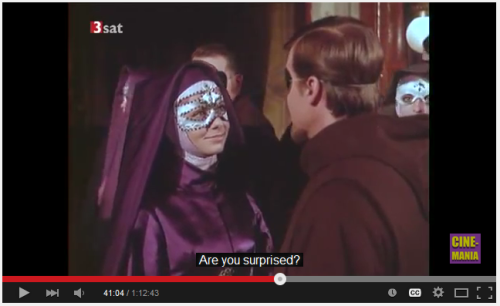
Bill, in Eyes Wide Shut, meets at the costume shop a girl who is hinted at being prostituted by her father. In the book, she is a Pierrette, a female Pierrot. Glück keeps her a Pierrette, a clown, in his Traumnovelle, but he also has her pirouetting as she walks, constantly turning in circles, so that he seems to be conflating the pirouetting with the idea of Pierrette perhaps through phonetic similarity.
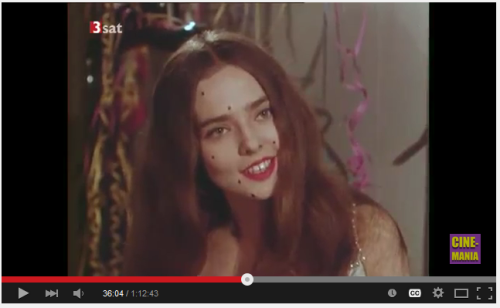
Kubrick retains this Pierrette by having a costume for a Pierrette (though not skirted) upon a mannequin by which Bill stands as he watches the encounter between the costumer and his daughter in the office.
This Pierrette, as with Fridolin’s wife, also appears at the masked ball in Glück‘s Traumnovelle. She even does a little pirouette before Fridolin at the ball.

Marianne also appears at the masked ball in Glück‘s Traumnovelle.
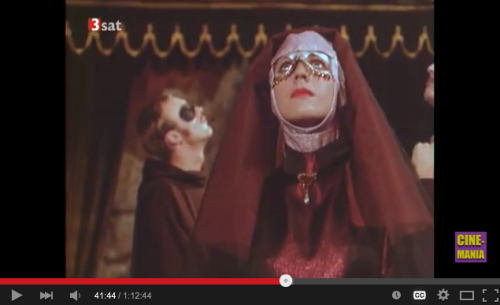
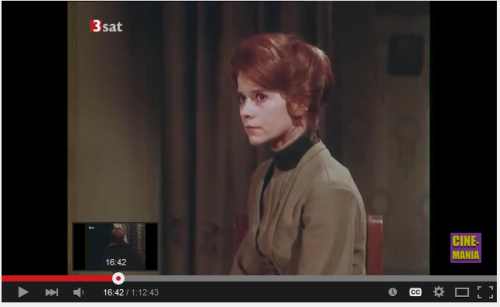
And yet Fridolin doesn’t recognize these women at the masked ball though they are expressions of his seeking his deepest desire, which he has given as being Albertine. Albertine is herself but a representation of the soul’s deepest desire, a dim shadow of it, as a fallen Sophia, or the fallen shadow/mirror of Narcissus, the expression of a hidden ideal in the physical world. The as above, so below.
Why are the characters looking up in one of the above screengrabs? They are listening, at the beginning of the ball, to a woman singing a beautiful aria, accompanied by organ. Then the “nuns” strip and they and the men dance a round to popular music played by the pianist, the dancers reflected in a mirror before him, he having earlier related to Fridolin that it is by virtue of a mirror that he watches the partiers through his mask, as shadows. This is comparable to the beautiful music in Eyes Wide Shut replaced with the “Strangers in the Night” dance.
What do we see in Domino's apartment in which are numerous masks? When Bill stands before the mirror, speaking with Alice on the phone, a prominent book is Shadows on the Mirror.
Fridolin’s redeemer is a little different from Bill’s in that she casts off her veil and mask, which later inspires Fridolin, in his hearse-coffin, to tear off his own mask.
She cannot survive--and here is why she cannot. A revelatory, deeply spiritual experience is a thing reserved for the initiate. They cannot describe its essence to another, for it turns to ashes upon exposure to the scrutiny of reason. Just as that which belongs to the underworld/fairy realm is often unable to survive exposure to daylight, Fridolin experiences the death of his redeemer when he attempts to return and find her, for his experience cannot be replicated. This is why he is unable to recognize her with any certainty when he visits the morgue, for the shell in it hasn’t the exquisite life with which he was touched during the initiation experience.
As related in Schnitzler’s novel:
...whether the woman now lying in the mortuary was the one whom twenty-four hours earlier he had held naked in his arms, to the wild accompaniment of Nachtigall’s piano, or whether she was really a complete stranger, of one thing he was absolutely certain. Even if the woman he was looking for, had desired and for an hour perhaps loved were still alive, and regardless of how she continued to conduct her life, what lay behind him in that vaulted room--in the gloom of flickering gas lamps, a shadow among shades, so dark, meaningless and devoid of mystery as they--could now mean nothing to him but the pale corpse of the previous night, destined irrevocably for decay.
As Fridolin examines the woman in the mortuary, her body already decaying, he still sees perhaps “a faint and distant gleam in the eyes beneath those half-closed lids, trying to make contact with his own, and, as if drawn on by some enchantment, he bends down over her. At that moment the dream is broken by the pathologist who asks what he’s doing. Fridolin pulls away, coming to his senses. “He felt as though it were only now, at that very moment, that this woman had died.”
This is the fundamental essence and truth of the death of Bill’s redeemer. Mandy.
A difference that Kubrick makes in his retelling of Schntizler’s novel is that he doesn’t so easily drop the death of the redeemer as does Schnitzler and Glück. Trauma is German for dream but it is also trauma, traumatic, and Kubrick explores the trauma of the experience and its impact. He prepares for the emotional impact of the trauma by adding Victor’s party at the beginning of the film in which Bill treats Mandy for her overdose. Schnitzler and Glück do not have this. And then Kubrick returns to this with the confrontation between Victor and Bill in the billiards room.
Now, I don’t recollect Schnitzler ever giving the first name of Marianne’s fiance. He may and I just don’t recollect it, but Glück does give a first name for Marianne’s fiance, and it is Victor. Kubrick instead gives the name of Victor to, well, Victor, and Marion’s fiance is instead Carl Thomas. Just as Fridolin is surrounded by twins of himself at the masked ball, Bill most obviously confronts his twin in Thomas (meaning twin), as we see in Marion’s fiance a shadow of Bill. That Kubrick takes Glück‘s Victor and renames him Carl Thomas, then creates the character of Victor at whose party Bill begins his initiation into the underworld, and who later confronts him and tells him that what he has experienced is all play-acting, is significant.
Here is the play Be Black, Baby from De Palma’s, Hi, Mom! It is presented as satire, but one needs to watch it as an example of the initiation experience. It has the same elements of Bill entering the theater with expectations of being able to remain an observer, having the tables turned on him so that he is directly immersed in the experience through threat of violence, then later is supposedly freed from that violence by Victor revealing to him that none of it was real, the only intention was to frighten him.
First posted on Tumblr April 2015. Other posts on "Traumnovelle" can be found in the supplemental sections of the analyses of "Eyes Wide Shut" as well "The Shining".
1800 words or 4 single-spaced pages. A 14 minute read at 130 wpm.
Go to Table of Contents of the EWS analysis
Link to the main film page for all the analyses

